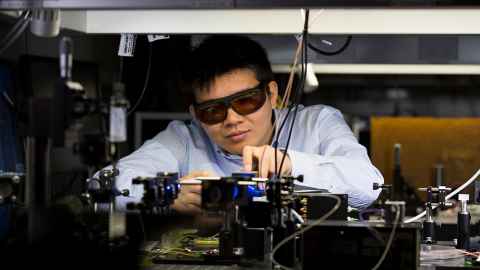Applied Physics
Applied Physics equips graduates with the rigorous analytic skills of a traditional Physics programme. It also provides a broad range of additional interdisciplinary skills sought by both New Zealand industry and many areas of scientific research.

Subject overview
Applied Physics is designed for students with a desire to undertake research and an interest in the application of physics theories to solve problems.
Choose from four sub-disciplines
Medical Physics and Imaging Technology (MPIT) – Medical Physics and Imaging Technology involves the application of Physics theories, technologies and methods in the fields of biomedical imaging, modelling, diagnostics and disease treatments. This specialisation will train graduates who are proficient in the complementary areas of Physics, Biology and Physiology; and skilled in the design and application of imaging and biomedical technologies. Graduates will likely work in the biomedical industry, pursue a research career in biomedical optics or engage in further training to qualify as registered medical physicists.
Nano and Materials Physics – Throughout history, people’s lives have been improved by efforts to use, understand and make new materials. Today, basic Physics and Chemistry skills are critical for making the materials which will build tomorrow’s computers; improve medical care; monitor and care for our environment; and support a sustainable economy driven by renewable energy. Materials innovation generates companies and technologies that have global impact. It has underpinned recent growth in NZ’s high-value manufacturing sector.
Photonics – Photonics is the science and technology of light. It is one of the key enabling technologies of the 21st century, with applications across sensing, communications, manufacturing and health. A recent study by the Australia and New Zealand Optical Society estimated the total value of Photonics to the NZ economy to be NZD 1.2 billion. A combination of courses from Physics and Electrical Engineering will enable students to work in this exciting new area.
Space Systems – New Zealand is now a space-faring nation, with a burgeoning space economy valued by a recent report at NZD 1.7 billion. Space Systems includes remote sensing, imaging, orbital dynamics, material science, mechanics, programming and fluid mechanics. A Space-Systems degree combines courses from Physics and Mechanical Engineering and will prepare you to work in a fast-evolving marketplace.
The programme has a strong applied focus, with a 45-point fourth year research project typically to be carried out in collaboration with a local industry or medical partner. The many strong relationships Department of Physics researchers have already established with NZ high-tech companies will allow students to choose from a wide range of potential industry projects.
Location
The Applied Physics specialisation is taught at the City Campus.
Where can Applied Physics take you?
The degree is designed to position its graduates for entry into New Zealand’s high-tech industries, as well as allowing them to proceed to graduate study.